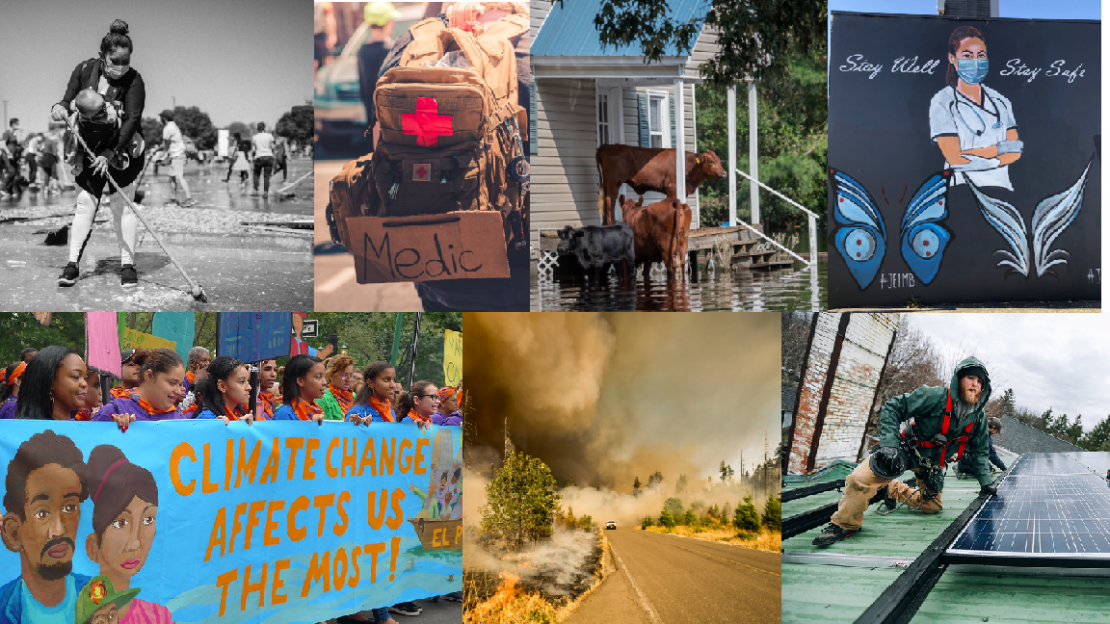As the impacts of climate change accelerate for every community and sector, so do efforts to prepare for and progress through often unpredictable and transformative challenges.
Philanthropy faces immense and varied needs for investment at the intersection of climate change, health, and equity—especially for communities that are being deeply and disproportionately impacted. The positive opportunities—to protect health, eliminate inequities, improve the environment, and reshape our neighborhoods and communities—are unprecedented.
This toolkit is intended to accelerate investments by helping funders gain a sense of a large, complex, and interconnected landscape. Both funders and nonprofits may use this site to find new resources, connect to new partners, and ramp up their efforts at the frontlines of climate change.
Overviews
- Introductions to this giving area and to climate impacts of concern
- Profiles of funders and nonprofits working at the frontlines
- Resources for funding and working at the frontlines
Who's Doing What?
- Active foundations & nonprofits
- Major hubs of activity
- Government funding
Resources
- First Reads
- Resource lists (by impact, issue, and geography)
- Multimedia materials.
WHY WE’RE INVESTED: FIELD PERSPECTIVES
Many organizations are tackling health and equity issues and building community resilience in the face of climate change. Groups focus on a wide variety of places, sectors, and issue areas. Learn from groups serving as hubs of nonprofit activity.
As the largest portion of the healthcare workforce and the most trusted profession, nurses already see the impacts of climate change in the people and communities they care for.
This work is not charity, it’s strategy. We must return power, resources and wealth to communities because they know what they need best.
It is no coincidence that the communities most impacted by COVID-19 are also overburdened by pollution, respiratory illness, climate change, and high unemployment.
WHY WE’RE INVESTING: FUNDER PERSPECTIVES
By addressing intersecting problems with mutually beneficial solutions, philanthropy can help our society respond strategically, rather than piecemeal, to this era’s co-occurring crises of the pandemic, racial and democratic system upheavals, climate change, and widening economic inequalities. Learn more from funders about what they're funding and why.
By working together with hospitals, health care systems, public health departments, health practitioners, climate advocates and others, we aim to build climate resilience.
Linking the issues of climate, COVID-19, and racial equity will be essential to enable focus on the important public health benefits of climate action.
By supporting leadership from marginalized communities, we can collaboratively develop effective and equitable strategies to care for creation.
WHY WE’RE SUPPORTING PHILANTHROPY FOR CLIMATE, HEALTH, AND EQUITY
This toolkit is a joint effort by 8 philanthropy-serving organizations (PSOs). Each has specific areas of interest in climate, health, and equity work. And all have an interest in helping their members learn, invest, and connect across those interests. Learn more about the toolkit's PSO partners.
The environment and climate are critical determinants of health and well-being. Climate change is a health equity issue.
Investing in climate-affected communities will not just protect the climate. It will help impacted communities take control of their health and their future.
Cities and regions are laboratories for new ideas and innovation to secure people-centered climate policies.
This multifaceted field generates more information and activity than one toolkit can capture. As such, this resource offers a limited cross section of information designed to point funders and others towards a diversity of knowledge and activity that could improve and accelerate grantmaking. We welcome ideas for expanding and updating this resource.

Photos: Parker Johnson, Max Bender, Ann McArthur, Janine Robinson, Marcus Kauffman on UnSplash, Susan Melkisethian, Stephen Yang, The Solutions Project
Background photos by Ben Wicks on Unsplash; Green Lane Project; US Department of Agriculture.








